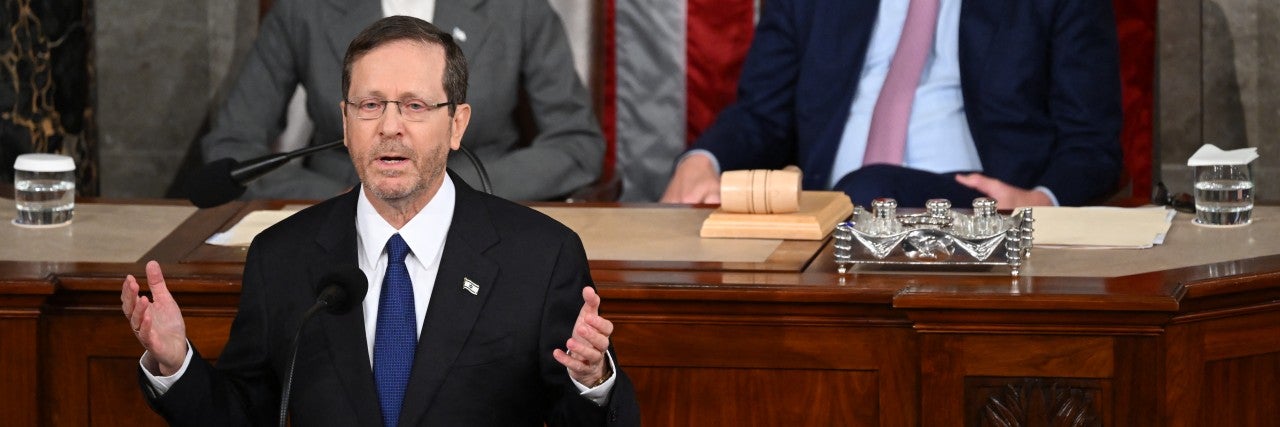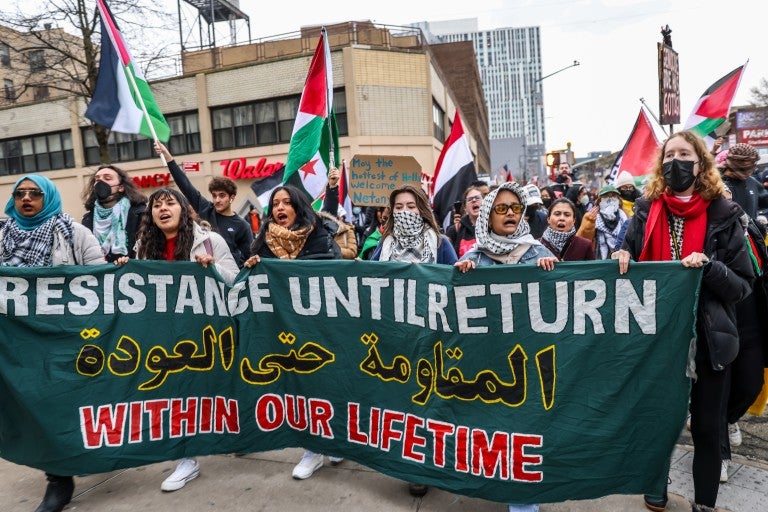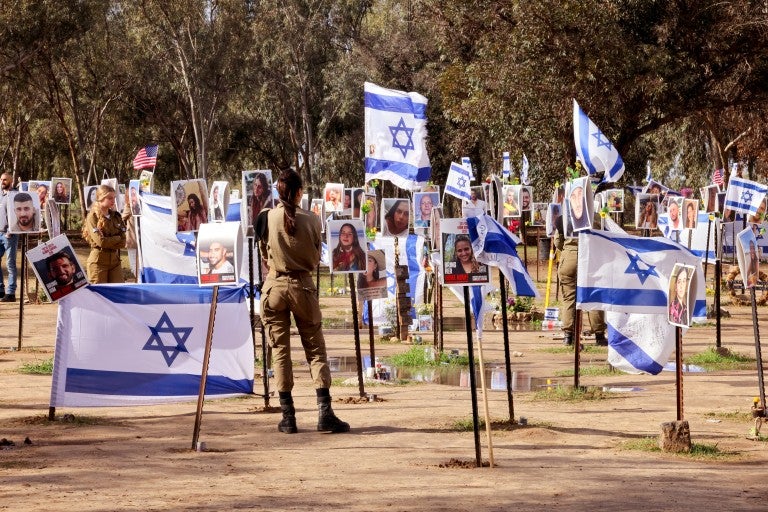July 21, 2023
This week, Israel’s President Isaac Herzog made a historic trip to the United States, becoming only the second Israeli president to address a joint session of Congress as part of a celebration of Israel’s 75th anniversary. His father, former President Chaim Herzog in 1987, was the first.
“Standing here today, representing the Jewish, democratic State of Israel in its 75th year, at the very podium from which my late father, President Chaim Herzog spoke, is the honor of a lifetime,” he told U.S. lawmakers.
The day before his congressional address, Herzog met with U.S. President Joe Biden at the White House. The two leaders discussed the U.S.-Israel relationship, the judicial reform process in Israel, Hezbollah, the Iranian nuclear threat, and efforts to build regional cooperation in the Middle East.
“President Herzog’s address to Congress is a potent symbol of the ironclad partnership between the U.S. and Israel and how it has transformed the Middle East,” AJC CEO Ted Deutch said in a statement. “It also underscores the president’s vital role as a bridge builder, one who offers pragmatic and actionable solutions to many of the issues that confront Israel.”
Here are five key takeaways from Herzog’s historic address to Congress.
-
The unbreakable bond between the U.S. and Israel has deep roots.
Acknowledging the grandson of President Harry Truman in the audience, Herzog paid tribute to the 33rd U.S. President for being the first world leader to officially recognize the State of Israel, eleven minutes after its founding. He recounted how his own grandfather, Rabbi Yitzhak Isaac Halevi Herzog, brought tears to Truman’s eyes when he personally thanked him for helping to bring about the rebirth of Israel.
As a new generation of Israelis and Americans rise to leadership, he said it is important that they not take for granted the formative years of Israel, and America and Israel’s relationship.
“It is clear that the shift in generations does not reflect changing values. Nor does it indicate changes in our interests,” Herzog said. “When the United States is strong, Israel is stronger. And when Israel is strong, the United States is more secure.”
-
Israel longs for peace in the region.
From the unprecedented peace treaty between Israel and Egypt in 1979 to the historic Abraham Accords with the United Arab Emirates, Bahrain, and Morocco in 2020, Herzog said the peace that the U.S. has brokered between Israel and its neighbors has revolutionized the Middle East.
“This is a peace anchored in trust, hope and prosperity,” he said. “A true game changer.”
“Israel’s hand is extended, and our heart is open, to any partner in peace – near or far,” he said, adding that he is hopeful that America’s efforts to solidify peaceful relations between Israel and Saudi Arabia will bear fruit.
Herzog called peace with Israel’s Palestinian neighbors his “deep yearning.” But stressed that true peace can not be anchored in violence. Acknowledging Israeli mother Leah Goldin in the audience, Herzog called on Hamas to release the body of her son, Lt. Hadar Goldin. Goldin and St.-Sgt. Oron Shaul were killed in the 2014 Gaza war, but remain missing in action. Two Israeli civilians Hisham al-sayed and Avera Mengistu also have been held hostage by Hamas for years, Herzog said, adding that terror undermines any possibility for a future of peace.
“Israelis are targeted while waiting for buses, while taking a stroll on the promenade, while spending time with their family,” Herzog said. “At the same time, successful terror attacks are celebrated, terrorists are glorified, and their families are financially rewarded for every Israeli they attack. This is inconceivable. It is a moral disgrace. Terror is not a bump in the road. Terror is hatred and bloodshed. It contradicts humanity’s most basic principles of peace.”
-
Iran is not interested in nuclear power for peaceful purposes. Iran wants a bomb.
Herzog reiterated that Israel is determined to prevent Iran from acquiring nuclear weapon capabilities, warning that such capabilities would pose a threat to the stability of the Middle East and beyond. He pointed to the many places Iran has exacerbated pain and suffering, including Yemen, Gaza, Syria, Lebanon, Iraq, Ukraine, and Iran itself, where the regime has brutally suppressed its own people.
But the regime has made it clear that Israel is Enemy No. 1 – for no reason other than it being the Jewish state.
“Israel has no border with Iran,” Herzog said. “Israel has no resources contested by Iran. Israel has no conflict with the Iranian people. And yet, the Iranian regime – together with its proxies throughout the Middle East – is aiming and working towards destroying the State of Israel, killing the Jews and challenging the entire free world.
“Allowing Iran to become a nuclear threshold state – whether by omission or by diplomatic commission – is unacceptable,” Herzog said. “The world cannot remain indifferent to the Iranian regime’s call to wipe Israel off the map. Tolerating this call and Iran’s measures to realize it, is an inexcusable moral collapse.”
-
Judicial reform debate proves that democracy is in Israel’s DNA.
Herzog described the many expressions of democracy in Israel: the simultaneous sounds on late Friday of the muezzin calling Muslims to prayer and the siren announcing the Sabbath in Jerusalem; the LGBTQ Pride Parade in Tel Aviv; the protection of human and civil liberties; the strong and independent judiciary; and the 120-member Knesset “comprised of Jews, Muslims, Christians or Druze, representing every opinion under the Israeli sun.”
“Our democracy is also reflected in protesters taking to the streets all across the country, to emphatically raise their voices and fervently demonstrate their point of view,” he said of the debate and discord over proposed judicial reforms. “Our democracy is the blue and white Israeli flag waved and loved by all Israelis taking part in the debate. … Although we are working through sour issues, just like you, I know our democracy is strong and resilient. Israel has democracy in its DNA.”
-
Criticizing Israel is fair, but denying its right to exist is antisemitic.
The new generation of leaders must understand that criticism of Israel is fair, but it must not cross the line into denying the State of Israel’s right to exist. Herzog thanked President Biden for presenting the first-ever U.S. National Strategy to Counter Antisemitism, which includes dozens of policy recommendations from AJC.
“Questioning the Jewish people’s right to self-determination is not legitimate diplomacy, it is antisemitism,” he said. “Vilifying and attacking Jews, whether in Israel, in the United States, or anywhere in the world, is antisemitism.”


